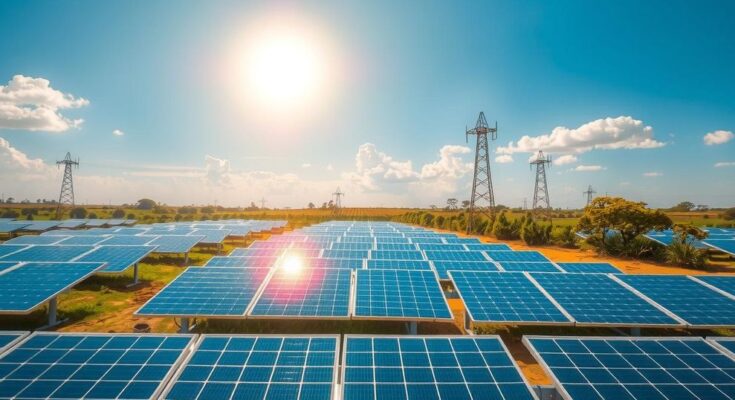Chidi Okonkwo, a Nigerian businessman, warns that the government’s plan to ban solar imports may escalate energy costs in a country reliant on solar due to erratic national grid supply. While federal initiatives aim to boost local solar production, experts predict that a ban could hinder affordability, drive many back to generators, and particularly affect rural communities dependent on solar energy. The potential price increases could push systems out of reach, exacerbating energy poverty.
Chidi Okonkwo, a businessman utilizing solar panels for his grocery store, expressed strong concerns about the Nigerian government’s impending ban on solar panel imports, likening it to “outlawing umbrellas during the heaviest rains.” In a nation where the national grid offers only limited electricity daily, solar energy has become essential for powering businesses, illuminating homes, and operating critical medical equipment in remote clinics.
As Nigeria experiences a surge in solar energy deployment, its affordability remains a pressing issue. The federal government is invoking Presidential Executive Order No. 5, which prioritizes local content in science, engineering, and technology, with the hope of meeting solar energy demands domestically. Uche Nnaji, the minister of science and technology, asserted, “We have lithium in abundance here in Nigeria… [it] will be processed and used as batteries for electric vehicles.”
Nevertheless, energy experts caution that the proposed ban may echo the past decision to close land borders to combat smuggling. Aisha Mohammed, an analyst at the Lagos-based Center for Development Studies, warned that this could lead to increased prices for solar panels, making them unaffordable for numerous Nigerians and hindering business investments in solar power.
Jide Pratts, country manager of Trade Grid, criticized the ban as premature, noting that past attempts to eliminate imports for various products have often failed to achieve their objectives. He stated, “You do not stop imports until you provide incentives for local capacity to meet at least 70 percent of local demand.”
Experts from BusinessDay highlight that Nigeria’s local solar manufacturing sector remains immature, with limited assembly plants incapable of fulfilling the country’s vast demands. Chioma Nwachukwu, a project manager for a solar nonprofit in Kano, remarked that locally manufactured solar panels tend to be pricier than imported options, thereby sidelining average Nigerians.
Moreover, imported solar systems in Nigeria present a wide price range, with basic setups costing N400,000 and comprehensive systems reaching up to N20 million. For instance, Juwon Adesanya invested N4 million in a system that supports various appliances, while high-end systems priced between N10–N30 million offer near-total energy independence.
If the import ban is implemented, experts foresee a significant price hike for solar installations, projecting increases of 40-60 percent, as per Tunde Olawale, a renewable energy consultant. This development could compel consumers to revert to generators, exacerbating pollution and energy poverty, particularly in rural areas where solar energy is vital.
Adebola Ogunleye, a frozen food vendor, articulated the personal stakes involved, stating, “If solar becomes too expensive, I’ll have to raise my prices… But my customers are struggling too.”
The proposed ban on solar panel imports in Nigeria raises significant concerns regarding its potential repercussions on solar energy accessibility. With solar energy becoming increasingly vital for countless households and businesses, especially in rural areas, this initiative may lead to inflated prices, limiting access for low-income families. Experts advocate for a more strategic approach to enhance local production capabilities while balancing market dynamics, thereby avoiding detrimental impacts on the solar sector and the broader economy.
Original Source: businessday.ng




